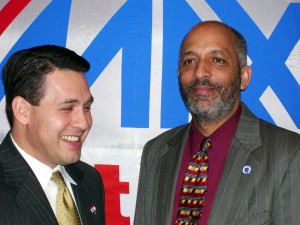By: Bob Okoniewski – January, 2010

As we go to print, the City of Lawrence stands on the threshold of history.
On Monday, January 4, Lawrence state representative William Lantigua was sworn in as the city’s first elected mayor of Hispanic descent.
As a newly elected mayor, however, Mr. Lantigua is now faced with a challenge befuddling most mayors – new and old – across the Commonwealth: How to balance the municipal budget amid economic crisis; shrinking state local aid payments; intransigent union demands on pay raises, job protection, and health insurance; and locked in pension costs that are certainly more lucrative than anything the private sector employee sees, just to name a few challenges.
At his inauguration, Mr. Lantigua spoke of his vision for the next four years – how to address the challenges of today and what his priorities are for the future.
For many, this will be the first time that they have ever heard him articulate a vision for our city. For all Lawrencians, however, much will rely on his ability to succeed.
Indeed, Lawrence is at a crossroads.
As Patrick Blanchette and the ‘08-’09 city council scurry out the door into the dead of night leaving behind a complete financial disaster, Mr. Lantigua certainly will spend the bulk of his tenure figuring out how to balance the books while making sure basic services, especially fire and police, are delivered adequately and efficiently to an anxious citizenry.
As we all witnessed history on January 4, there are certain questions demanding appropriate response:
1. What exactly is the size of the financial mess the outgoing city council and Sullivan administration are leaving the incoming mayor and the new council?
Former city budget director Mark Andrews, (who high-tailed it out of here one step ahead of the posse to a new job far, far away), claimed the budget deficit is less than $2 million.
However, the state Department of Revenue has estimated that it is closer to $17 million for the current fiscal year 2010 that ends on June 30th, expanding out to $30 million through fiscal year 2011.
This is interesting given the fact that the city pulls in about $45 million on its own through taxes and fees and depends on the state for the rest of our $200 million in non-school budget funding.
The fact that Patrick Blanchette and the ‘08 – ‘09 city council closed up shop with some nice parting gifts in mid-December and self-congratulatory speeches without addressing the deficit and setting a tax rate will make Mr. Lantigua’s job that much harder kicking off 2010.
Much depends on the real size of the budget deficit and whether that gap can be closed with some immediate, severe budget cuts and layoffs or something much more drastic, like a $35 million loan that it will be paying back for the next 20 years.
2. With the crisis comes an opportunity for reforms at City Hall. Is Mr. Lantigua up to that task?
Clearly the city cannot continue with the same old, same old. Our municipal government demands re-organization and consolidation. We do not need to foster continued duplication of services within city hall and the school department, for instance.
But, does Mr. Lantigua have the imagination and gumption to tackle such political hot potatoes that Sullivan and his team punted on for eight years?
There certainly needs to be a focus on providing service to the taxpayers and the public. For many offices, it is hit or miss that the office is staffed at any given point in time during the work week. For example, how can we have a city clerk’s office closed at lunch time because of an inability of the clerk to manage his people properly, yet there are three clerks taking minutes at each council meeting, while it is being taped for the viewers at home? There is no reason why the mayor cannot hire competent managers and institute cross training and stagger lunches amongst city hall employees so that no office is closed on any work day, even if it is normally staffed by a single person.
3. What will Mr. Lantigua do with Wilfredo Laboy? For how long will the state allow this soap opera to continue? And just when will the school department vacate its luxurious office with its high-priced rent and relocate to city owned property?
The fact that the school superintendent still pulls a paycheck has become a running joke. Frankly, once state investigators found the cache of booze in Laboy’s school department office, the school committee should have fired him then and there for cause. I cannot imagine at this point that there will be a collective majority will to fire the superintendent for cause for this transgression, absent some flexing of mayoral muscle by Mr. Lantigua to move this ugly chapter of our history behind us. Further, the Commonwealth of Massachusetts effectively pays 100% of the cost of our school system. How long will the Patrick administration allow this saga to continue before it becomes a campaign issue in the upcoming gubernatorial election? If the Patrick administration is going to help the city with a $35 million loan, then it certainly cannot be on the political hook for Laboy, too.
4. Who will Lantigua bring in as part of his team?
To the victor go the spoils.
So certainly no one begrudges a winning candidate from brining in his own people to run the show. However, Mr. Lantigua needs to properly handle the removal of current department heads he deems expendable or hostile to his agenda and the hiring of qualified professionals to properly implement a plan of reform, re-organization, and consolidation. To simply hire more hacks to maintain that fine Lawrencian tradition of seeking the lowest common denominator will augment an already sorry state of service delivery and depress further an already skeptical tax-paying public. Job postings and interviews take time. The quicker Mr. Lantigua can clean house and hire real professionals to run the various departments, the sooner the city’s house can be restored to order.
5. Will the city council be a rubberstamp for the mayor?
Mr. Lantigua can lay claim to the political loyalties of at least six city councilors. Will a majority of the council kowtow to all that Mr. Lantigua demands, or will councilors actually demonstrate collectively some real leadership and imagination to work in tandem with the mayor and his team toward a common good? A lack of cooperation between the executive and legislative branches has poisoned city hall for at least the last four years. Our city cannot continue to endure such hostilities amidst the current crisis. But at the same time, there are nine individuals on the council who have ideas of their own to improve our community. The challenge for the new mayor and the council leaders is to get everyone on the same page toward the common goal of rebuilding our community.
 Bob Okoniewski is a former member of the Lawrence Zoning Board in Lawrence is a political activist and is a practicing attorney. You can email him at bobokesq@hotmail.com.
Bob Okoniewski is a former member of the Lawrence Zoning Board in Lawrence is a political activist and is a practicing attorney. You can email him at bobokesq@hotmail.com.
